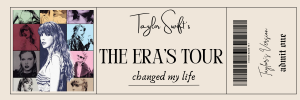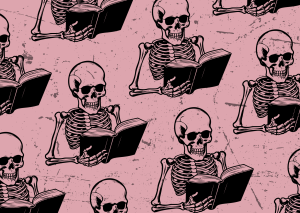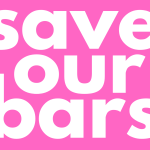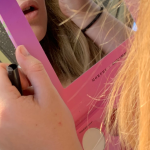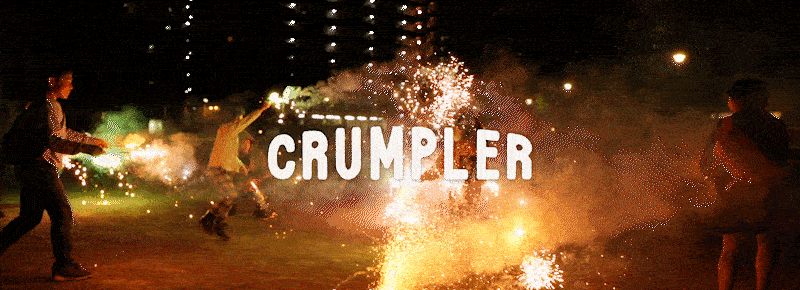Sex is many things for many different people. Whether you’re nervous about having sex for the first time, excited to try new things, disinterested in the concept, or exploring your sexuality, certified sex coach Georgia Grace is here to answer all your burning questions.
If the name sounds familiar to you, that may be because she has appeared on a few notable shows, such as The Bachelor and Abbie Chatfield’s podcast It’s a Lot. More recently, she co-chaired a sexual wellness event here at QUT. I got in touch with Georgia to discuss her journey to becoming a sex coach, how she feels about the growing sex-positive movement, and to answer some of the Glassies’ questions.
For those people who don’t know you or aren’t sure what a sex coach is, could you please explain who you are and what you do?
I am a certified sex coach, and basically that means I support people in having a more fulfilling relationship with sex, their bodies, and others. My training is in somatic sexology, which means bringing awareness to the body. I’ve done a range of qualifications and certifications under that umbrella to work in a coaching and education capacity with people. So, I see people in sessions, run events, and am Normal‘s in-house sex coach. I also do a lot of writing and content creation for my podcast and all those things.
How did you start your career as a sex coach? Have you always been interested in this role?
I have a background in journalism. I studied journalism at university, and I worked in PR for a few years until I realised that there was just so much that needed to be done in this space, so I quit and joined the many other pioneers who have been working in this space. I studied at the institute of somatic sexology. It was fascinating when I started out – there was a lot that was unknown about this space, but because we’re in a sexual revolution and there is so much sex positivity, I’ve seen incredible changes over the past few years.
Sometimes I think I am in a little bubble of left thinkers and sex-positivity in social media, but in your experience, does it seem like it’s changing across the board?
I believe there is a lot more discourse in mainstream media around the importance of sex-positive information that is shame-free, thorough, and age-appropriate. All people should have access to sex-ed around consent, relationships, and sexual relationships that are relevant to them because, for far too long, we have solely focused on more hetero cisgender experiences. So, while there are definitely more mainstream conversations about sex positivity, I think we still have to recognise that many people don’t have access to this and may have to work through their own things, whether that is shame or stigma, it could be religious or cultural beliefs getting in the way, as well as people who may just not want to engage with these kinds of topics. So yes, there is this wonderful movement at the moment, but there is still a culture of shame and taboo around sex.
Have you been to schools to teach sex-ed?
I haven’t taught at schools yet, but I’ve spent time working with university students. Typically, my clientele is 18 to 70, 70 being the anomaly. At some point, I would really love to be able to provide that for high school students. There are also some fantastic companies and organisations already working in that space. However, we do need to see sex-ed come into schools that is age appropriate.
What age do you think is ideal to start introducing children to sex-ed?
Well, as we’re seeing now, we should teach consent education as soon as they’re in school, like kindergarten. When I talk about age-appropriate, we look at young people as young as six who are already being exposed to porn these days. So, if we’re looking at the conversation and the education we’re having, it would be very different speaking to a six-year-old about what they have witnessed in the playground, maybe an older sibling showing them a graphic image. That would be very different from the lessons that you would take in high school. Still, it is so easy to access information these days, like you can google boobs or google sex, and porn comes up. This is essentially their first introduction to sex-ed, so the lessons and information will be really different from what would be given to primary school children compared to high school children. But, because it’s so easy to access this information about sex online, I think it is essential to teach young people about what sex is and what healthy relationships look like.
Some conservatives will think that talking about sex with younger children will encourage them to engage with sex more or bring it to the front of their minds. However, we don’t need to bring it to their attention because it is already everywhere. That’s not something that we as a society or individually can police, but we must educate children about the facts and what sex is truthfully like.
How does pop culture influence how we think about sex and do you believe proper sex education is a way to make us less impressionable when it comes to pop culture references to sex?
Pop culture has a massive impact on how we understand sex, and because people aren’t getting thorough sex education in schools, from parents or from credible online sources that are expert-led, pop culture ends up filling in the gaps. Pop culture fails to provide an accurate insight into what is actually pleasurable because, of course, when you’re watching sex movies, its primary function is to entertain and arouse, not inform. I’m not saying that pop culture is bad at all. I think it’s fun and sexy and makes up a part of who we are and can be inspiring, but by no means should we see it as our education. I think proper sex-ed would allow young people to identify where pop culture depicts a performance, not reality. So, because we don’t have comprehensive sex education, most people will take pop culture as fact.
Why is there a stigma about talking about sex in high school, and how could that be overcome potentially?
High school sex education is typically taught in one or two lessons by a teacher who may have their own shame or questions around sex and who possibly, and most likely, hasn’t received thorough sex-positive education themself that is needed to teach other young people. As a result, everyone leaves feeling ill-equipped. Also, many schools base their sex education on specific religious beliefs, such as abstinence-only sex-ed. Therefore, there is very little information about queer experiences and anything beyond reproductive sex education. For example, some schools teach how to put a condom on a banana or how to become pregnant. This isn’t necessarily the most relevant thing to young people because some young people aren’t engaging in sex at that age, so what could be more helpful is to talk about anatomy, relationships, and consent to find ways to equip them to have healthy pleasurable first experiences.
Glassies’ Questions
Is it “un-feminist” or wrong to want to get labiaplasty?
How I would approach this is instead of commenting on the moral code of this, I would be asking a few different questions. Some people get labiaplasty because it’s really uncomfortable for them. As a result, they’ve had many consultations with a doctor, not just with the person performing the labiaplasty, but they have made that choice for their body. However, there are so many things that I think we need to look at.
If it’s because you feel like you’re abnormal or there is something different or wrong with your body, I would suggest going online to this great resource called comfortable in my skin. This website shows a gallery of all different types of vulvas and the number of people who will look at that and say, ‘wow, I feel so validated‘ or ‘I feel so normal‘ or ‘I don’t think there is anything wrong with me now‘ is incredible because I think so much of porn influences how we view our bodies and what they ‘should’ look like.
The fact is, all genitals look different and there is no right way to look. So rather than commenting on someone’s feminism, because I think feminism shows up in many different ways, we should look to some resources. An incredible book by Roxanne Gay called Bad Feminist highlights all the rhetorics that are echoed to accuse people of not being feminist enough. So, I would say to people who question whether it is un-feminist to get labiaplasty, to remove the moral code and instead look at what you can do to feel more comfortable with your body.
What’s the best way to approach sex with someone new if you haven’t done it for a long time?
I think any time you’re having sex with someone new, the best thing to do is to open up the conversation. When talking about sex, people often feel a bit nervous or uncomfortable and it can feel awkward, but it is essential, and it may be asking questions like ‘what are you curious about?‘ ‘What turns you on?’ ‘How do you like to be touched?‘ ‘What are your boundaries?‘ ‘Is there any part of your body where you don’t want to be touched?‘ ‘What kind of sex do you like having?‘ ‘How are we going to have safer sex practices?‘ ‘What would they look like for us?‘
So, getting really curious and knowing that regardless of how long it’s been for you, you will have to learn about their body, and I think just take the pressure off yourself needing to be equipped with all the tips, tricks, and techniques because the best kind of sex you can have is attuned, present sex. So being connected with that person, where everyone involved is consenting and excited about being there, and the tips and tricks can come very quickly with a bit of communication.
What tips do you have for asexual people looking for a relationship?
I have a podcast about asexuality for InBed, which is a Nova podcast. It may even be more helpful to speak with an asexual person about this because I wouldn’t want to talk on behalf of the ace community, but perhaps the first thing to do is to find specific groups or communities. There are so many out there, especially online. One I worked with recently is ‘Australian Asexuals’, and it’s an organisation for activism, advocacy, and awareness. So yeah, find certain groups and communities as a way to connect. Know that many asexual people develop healthy, loving relationships, and there are so many people out there. If you’re struggling on a personal level to find different ways to communicate, it may be helpful to seek support from a relationship counsellor or educator so that you can feel equipped and supported personally. Again, it could be useful to speak with someone from the ace community who has experience with how to navigate that.
I am bi and want to explore with women, but I’m nervous about having sex with a woman because I don’t think I like giving or receiving oral sex – what should I do?
It is really human to be nervous when you’re trying something new for the first time, and I think we need to celebrate our boundaries when it comes to sexual preferences. If you’re not interested in giving or receiving oral, then that is something that should be discussed in a conversation before any sexual experience. There are so many other ways to have sex, and there are so many ways to redefine what sex looks like. Whether it is dry humping or using a strap-on, sex in the shower, mutual masturbation, or just kissing, it could be internal or external stimulation, fingering or massage; there is literally so much that you can do. I completely understand that there is this assumption that lesbian sex or vulva and vulva sex can involve oral sex, but that’s just one way to have sex. But it’s your sex life, and you get to define what it means to you. Suppose you’re not comfortable or excited, or willing to engage. In that case, you don’t have to, which is a great conversation to have before any sexual experience so that everyone involved is clear on your boundaries.
Recommendations from Georgia Grace
- Comfortable in my skin
- Bad Feminist by Roxanne Gay
- Nova podcast in bed
- Normal Podcast

